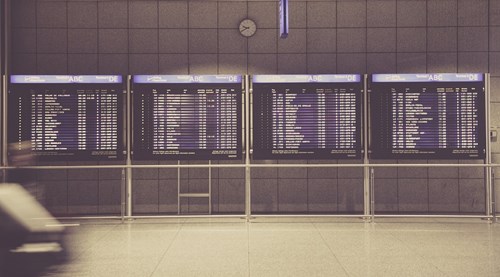The motivation and impetus for business travel is different for each individual and organisation.
Communication with stakeholders, including existing clients, potential new customers, shareholders, media, employees and team members, contractors and suppliers is an essential part of daily business life.
In our latest blog, we look at what you can do and how your TMC can help you to create positive corporate travel experiences which benefit your business and your employees.
The TMC's role in improving traveller experience
As with so many aspects of a TMC’s function on behalf of clients, the key to success is their ability to take on responsibility for your travel policies, giving you peace of mind that your people are getting the support they need and allowing you to concentrate on your core business.
As we’ve discussed in earlier blogs, ensuring that your business is meeting its duty of care for staff involved in corporate travel is essential.
You should also expect your TMC to be seeking value for money when arranging your travel. However, that doesn’t simply mean always providing you with the cheapest option on every trip.
As we’ve seen, there are times when there could be significant staff benefit in arranging a business class flight or sourcing a better quality hotel so that your traveller feels valued and arrives well rested prior to an important meeting.
At Clyde Travel Management, we have more than 30 years of experience in moving business travellers around the world and we understand the challenges of identifying savings and value in your travel spend.
Providing insight via the best use of data is an essential part of our customer relations service, allowing us to provide clients with the detail they need on booking behaviour, policy improvement and sustainable supplier choices.
And with business travel being a round-the-clock environment, we know that 24/7 support from our team is vital when the inevitable changes to itineraries, schedules, flights and meeting times occur.
Working in a sector where a fleet-of-foot approach to dealing with changing circumstances is of major importance, we deploy a range of sophisticated technology support to meet our customers' needs.
Our systems, which include proprietary workflow management, self-booking, airfare savings, quality control and information on restrictions are all mobile-enabled and can be accessed at any time, in any location.
Clyde’s booking tools mean travellers can book in the most convenient and cost effective way.
Our quality control solutions ensure that data capture and invoicing offer customer choice and process improvement and duty of care solutions provide you with peace of mind that you or your people can look forward to a safe trip with our support.

Create a Positive Travel Experience to Enhance Business Success
For some people, business trips are simply a method of boosting the company's success, opening up new business opportunities, establishing relationships with potential new clients, planning for growth or exploring new markets.
Another business traveler might see it as the ideal way to conduct research, explore different working methods, learn new skills or network with clients and suppliers.
And then there is the traveling employee who sees their job and their business trip as a chance to enrich their personal lives, to literally expand their horizons by experiencing new cultures and locations, meet new people or be inspired by innovative thinking.
The good news is that none of this is mutually exclusive - all these aspirations across different organisations and individuals can be met by working with your TMC to ensure that your business is focused on delivering a range of travel options which combine to create a positive business travel experience.
Value for money
For most organisations, business travel represents a significant but necessary expense. So it makes sense to ensure that, wherever possible, you get real value for the money invested in travelling for business purposes.
But it’s not simply about the bottom line although clearly that will always be an important factor in the success of a trip.
In the 21st century business environment, companies are increasingly recognising the link between the experience of the business traveller and that person’s job performance.
Every individual is different and, in the same way that we all bring a variety of skills and approaches to our roles, we also all react differently to the experience of travelling for business.
While some people involved in the world of corporate travel might embrace the idea of a fast-paced lifestyle on travel expenses with long periods away from home in new locations, others will react differently to the stresses and challenges that will always be a part of business travel, no matter how good your forward planning is.
A delayed flight, a bad night’s sleep in a hotel in a poorly-chosen location or a hectic itinerary are the kind of negative business travel experiences that can have a severe personal impact and make employees question their career choices.

Balancing work and life
There is now much greater awareness, alongside the financial expense of business travel, that there could be additional costs to an organisation in terms of productivity, staff wellbeing and employee retention.
No company wants to find itself in the position of losing a good employee because regular business trips are having a negative impact on their mental or physical health, personal relationships with colleagues or their general work life balance.
Similarly, businesses could be in a situation where the productivity of a reliable member of staff has declined because of issues experienced during business travel.
And, of course, these scenarios could have a further negative impact on the company's performance and culture if there is then a need for new recruitment to fill gaps left by employee burnout.
For companies with a responsible and responsive culture, a key feature of their travel policy should be a focus on the many positive aspects of business travels and how these can benefit staff, all of which helps avoid employee burnout.
Let’s take a look at some of the main benefits of business travel:
Confidence boosting
For younger members of your team, or less experienced colleagues, there are major positives to be gained in terms of helping to build confidence and broaden their skills by visiting new places as well as confronting different challenges which might not occur in day-to-day office life.
Face to face meetings
The pandemic confirmed for many of us that, while virtual communication such as video conferencing can be hugely beneficial in our daily business lives, there is often no substitute for engaging in face to face interactions.
The ability to interact in person and read or be more aware of a person's body language can have many benefits in a face to face meeting. A report by the Harvard Business Review showed that in person requests are 34 times more effective than those sent by email.
World of opportunity
Being able to visit a new city or country for business purposes gives employees the chance to explore in their down time and sample local sights and attractions.
The ability to enjoy some personal development and leisure time during business travel as well as focusing on the wider purpose of your business trip will have benefits for the employer and for employees.
Career development
For employees, learning the ropes on the job is all well and good but there are benefits to be had for the individual by maximising time away from the office on business travel.
A trip to a conference or industry seminars can spark innovative thinking, expose your people to new ideas, allow them to network with inspirational leaders and entrepreneurs and generally boost their personal development ambitions.
Strengthening bonds
As a way of building or enhancing a business relationship and rapport with a valued client, supplier or remote team member, a business trip for in person meetings can pay dividends in terms of productivity and job satisfaction.
And meeting face-to-face could be the impetus for driving a deal over the line, discovering new opportunities, winning a new contract with potential clients or showing a member of your team how much they are valued.
Feelgood factor
There’s strong evidence to show that, on their return from business travel, the productivity of employees is boosted. That’s often a response to the opportunity they’ve had to leave the office, enjoy new experiences away from their comfort zone and recharge their batteries, all of which helps avoid burnout.

Tips for better trips
With corporate travel being an environment subject to constant change, at Clyde we take the view that a process of ongoing review is essential if we want to ensure a positive traveller experience.
For that reason, we recommend that when we carry our a review of the client’s travel policy that we include feedback from your experienced travellers who can provide insight on what works, what doesn’t and what would help to boost productivity and wellbeing on future trips.
Different approaches work for different businesses but there are simple steps which can be taken to enhance the travel experience. Delays are inevitable in the world of business travel so providing employees with access to airport lounges can ease the stresses and strains of delays or waits for connecting flights.
Offering the opportunity to take a direct flight can save time and also build some breathing space into a traveller’s schedule.
And providing the option of door-to-door travel arrangements can also mean a smoother transition when your people reach their destination.
Seeing the big picture
Every company is different when it comes to business travel – which is why, at Clyde, we take the view that there has to be a bespoke approach for every customer.
The key is to make sure that you're seeing the big picture. Be clear about your objectives for the business as they affect your travel policy and decide where your priorities lie.
Business travel can be a highly significant expense – but, at the same time, remember that people are one of your most valuable resources and their wellbeing, productivity and job satisfaction have a huge impact on your organisation’s culture and on your wider business objectives.




